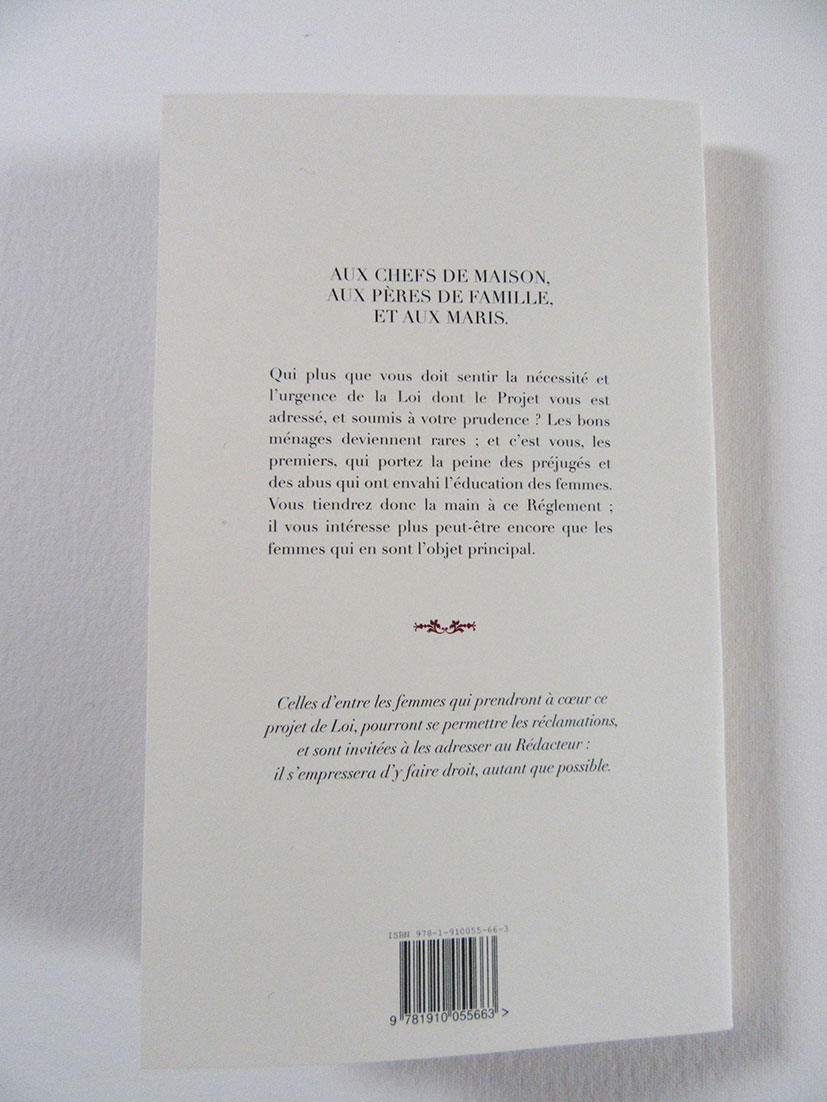Sharon Kivland
Projet d'une Loi portant défense d'apprendre à lire aux Femmes, 2019




Un extract de tract de Sylvain Maréchal, 1801
Publié à l’occasion de l’exposition de Sharon Kivland
Jamais fille chaste n’a lu de romans
Circuit, Centre d’art contemporain, Lausanne
Une proposition de Véronique Portal
9 novembre ~ 21 décembre 2019 An extract from the tract of Sylvain Maréchal, 1801 Published on the occasion of the exhibition by Sharon Kivland Jamais fille chaste n’a lu de romans
Circuit, Centre d’art contemporain, Lausanne A proposition by Véronique Portal
There is a suggestion of the impropriety of reading throughout the exhibition. There is reference to Sylvain Maréchal’s tract ‘Plan for a law forbidding a woman to learn to read’ (1801), which consists of eighty-two clauses, fortified by a hundred and thirteen reasons, to prove that the woman who knows the alphabet has already lost a portion of her innocence (his friend and biographer Madame Gacon Dufour declared that he must be partially insane), in acquiring excessive education, linking innocence and ignorance, carnal knowledge and book knowledge (we can find this too, in Sigmund Freud’s analysis of the young hysteric ‘Dora’). The tract was republished in 1853 as Il ne faut pas que les femmes sachent lire (‘Women must not learn how to read’). It was, of course, a satire, one that was misunderstood as such all too seriously.
L’inconvenance suscitée par la lecture est suggérée par l’exposition. Le tract de Sylvain Maréchal « Projet d’une loi portant défense d’apprendre à lire aux femmes » (1801) est constitué de quatre-vingt clauses, appuyées de cent trente raisons, servant à prouver qu’une femme qui connaît l’alphabet a déjà perdu une partie de son innocence lorsqu’elle reçoit une éducation trop poussée (l’amie et biographe de l’auteur du tract, Madame Gacon-Dufour, affirma qu’il était certainement fou), ce qui met en évidence le lien qui existe entre l’innocence et l’ignorance, entre la connaissance charnelle et la connaissance des livres (on retrouvera une telle interprétation chez Freud dans son analyse de « Dora » l’hystérique). Le tract fut republié en 1853 sous le titre « Il ne faut pas que les femmes sachent lire ». C'était, bien sûr, une satire, une satire qui n'était que trop mal comprise.
Publié à l’occasion de l’exposition de Sharon Kivland
Jamais fille chaste n’a lu de romans
Circuit, Centre d’art contemporain, Lausanne
Une proposition de Véronique Portal
9 novembre ~ 21 décembre 2019 An extract from the tract of Sylvain Maréchal, 1801 Published on the occasion of the exhibition by Sharon Kivland Jamais fille chaste n’a lu de romans
Circuit, Centre d’art contemporain, Lausanne A proposition by Véronique Portal
There is a suggestion of the impropriety of reading throughout the exhibition. There is reference to Sylvain Maréchal’s tract ‘Plan for a law forbidding a woman to learn to read’ (1801), which consists of eighty-two clauses, fortified by a hundred and thirteen reasons, to prove that the woman who knows the alphabet has already lost a portion of her innocence (his friend and biographer Madame Gacon Dufour declared that he must be partially insane), in acquiring excessive education, linking innocence and ignorance, carnal knowledge and book knowledge (we can find this too, in Sigmund Freud’s analysis of the young hysteric ‘Dora’). The tract was republished in 1853 as Il ne faut pas que les femmes sachent lire (‘Women must not learn how to read’). It was, of course, a satire, one that was misunderstood as such all too seriously.
L’inconvenance suscitée par la lecture est suggérée par l’exposition. Le tract de Sylvain Maréchal « Projet d’une loi portant défense d’apprendre à lire aux femmes » (1801) est constitué de quatre-vingt clauses, appuyées de cent trente raisons, servant à prouver qu’une femme qui connaît l’alphabet a déjà perdu une partie de son innocence lorsqu’elle reçoit une éducation trop poussée (l’amie et biographe de l’auteur du tract, Madame Gacon-Dufour, affirma qu’il était certainement fou), ce qui met en évidence le lien qui existe entre l’innocence et l’ignorance, entre la connaissance charnelle et la connaissance des livres (on retrouvera une telle interprétation chez Freud dans son analyse de « Dora » l’hystérique). Le tract fut republié en 1853 sous le titre « Il ne faut pas que les femmes sachent lire ». C'était, bien sûr, une satire, une satire qui n'était que trop mal comprise.